-
 Bitcoin
Bitcoin $114200
-0.03% -
 Ethereum
Ethereum $3649
-0.25% -
 XRP
XRP $2.963
-2.31% -
 Tether USDt
Tether USDt $0.9997
-0.02% -
 BNB
BNB $761.0
-0.17% -
 Solana
Solana $164.6
-2.06% -
 USDC
USDC $0.9997
-0.02% -
 TRON
TRON $0.3321
-0.45% -
 Dogecoin
Dogecoin $0.2010
-2.49% -
 Cardano
Cardano $0.7282
-2.60% -
 Hyperliquid
Hyperliquid $37.56
-2.50% -
 Stellar
Stellar $0.3935
-3.18% -
 Sui
Sui $3.440
-1.36% -
 Chainlink
Chainlink $16.49
-1.80% -
 Bitcoin Cash
Bitcoin Cash $558.0
-1.38% -
 Hedera
Hedera $0.2407
-1.49% -
 Avalanche
Avalanche $22.27
-2.29% -
 Ethena USDe
Ethena USDe $1.001
0.00% -
 Litecoin
Litecoin $118.6
-4.00% -
 UNUS SED LEO
UNUS SED LEO $8.995
0.02% -
 Toncoin
Toncoin $3.190
-5.11% -
 Shiba Inu
Shiba Inu $0.00001214
-1.51% -
 Uniswap
Uniswap $9.655
-1.88% -
 Polkadot
Polkadot $3.638
-0.50% -
 Monero
Monero $292.1
-1.82% -
 Dai
Dai $1.000
-0.03% -
 Bitget Token
Bitget Token $4.312
-0.90% -
 Cronos
Cronos $0.1389
-0.32% -
 Pepe
Pepe $0.00001026
-2.44% -
 Aave
Aave $258.2
-1.12%
How to have a Bitcoin payment address
To get a Bitcoin address, use a software wallet like Electrum, a secure hardware wallet like Ledger, or an online exchange like Coinbase; always back up your seed phrase.
Mar 29, 2025 at 10:57 pm
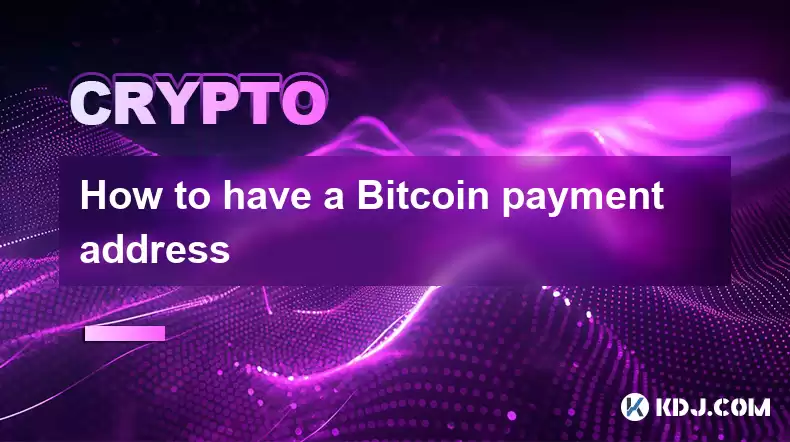
A Bitcoin payment address is essentially your unique identifier on the Bitcoin network. It's like your bank account number, allowing others to send you Bitcoin. Unlike bank accounts, however, you can have multiple Bitcoin addresses. This article will guide you through the process of obtaining one.
Generating a Bitcoin Address: A Step-by-Step Guide
The process of obtaining a Bitcoin payment address depends entirely on the method you choose to manage your Bitcoin. The most common methods are using a software wallet, a hardware wallet, or an online exchange.
Using a Software Wallet: Software wallets are applications installed on your computer or smartphone. Popular options include Electrum, Exodus, and others. After installing and setting up your chosen wallet, the process of generating a new address is usually as simple as clicking a "Receive" button. The wallet will then generate a unique address for you. Always back up your wallet's seed phrase; this is crucial for recovery.
Using a Hardware Wallet: Hardware wallets, such as Ledger and Trezor, offer enhanced security. They store your private keys offline, protecting them from malware and hacking attempts. Similar to software wallets, generating a new address typically involves navigating to a "Receive" section within the wallet's interface. The process is straightforward and guided by the wallet's software. Remember to keep your hardware wallet safe and secure.
Using an Online Exchange: Exchanges like Coinbase, Kraken, and Binance allow you to buy, sell, and store Bitcoin. They provide you with a Bitcoin deposit address. This address is specific to the exchange and is usually displayed on your account's dashboard. Note that using an exchange means you don't directly control your private keys; the exchange holds them for you.
Understanding the Address Format: A Bitcoin address typically looks like a long string of alphanumeric characters, for example,
1BvBMSEYstWetqTFn5Au4m4GFg7xJaNVN2. It's crucial to double-check the address before sending or receiving Bitcoin to avoid irreversible loss of funds. Mistakes in copying and pasting can lead to significant financial consequences.SegWit Addresses: Many newer wallets support SegWit (Segregated Witness) addresses. These addresses start with
bc1and offer improved transaction efficiency and lower fees. While not mandatory, using SegWit addresses is generally recommended. Check your wallet's settings to ensure you are generating SegWit addresses.Bech32 Addresses: A specific type of SegWit address, Bech32 addresses are becoming increasingly common. They're more efficient and secure than older address formats. They are also typically easier to read and less prone to errors during manual entry. Many modern wallets generate Bech32 addresses by default.
Choosing the Right Method for You
The best method for obtaining a Bitcoin payment address depends on your technical skills and security priorities.
Software Wallets: Suitable for users comfortable managing their own private keys and who prioritize control over their funds. They offer a balance of convenience and security, but require careful management to avoid loss of funds.
Hardware Wallets: Ideal for users prioritizing maximum security. The offline nature of hardware wallets provides robust protection against hacking and malware. However, they represent a higher initial investment.
Online Exchanges: Convenient for beginners, but they compromise on security and control. Your Bitcoin is held by the exchange, exposing you to their security vulnerabilities. Only use reputable and well-established exchanges.
Security Best Practices
Regardless of the method you choose, always adhere to these security best practices:
Strong Passwords: Use strong, unique passwords for all your wallets and exchanges. Avoid reusing passwords across different platforms.
Two-Factor Authentication (2FA): Enable 2FA wherever possible to add an extra layer of security. This usually involves using an authenticator app or receiving a code via SMS.
Regular Software Updates: Keep your software and hardware wallets updated with the latest security patches to protect against known vulnerabilities.
Beware of Phishing Scams: Be cautious of suspicious emails, websites, or messages requesting your private keys or wallet details. Legitimate entities will never ask for this information.
Offline Backup: Always create offline backups of your wallet's seed phrase or recovery key. Store these backups securely in multiple locations.
Frequently Asked Questions
Q: Can I have multiple Bitcoin addresses?
A: Yes, you can generate as many Bitcoin addresses as you need from a single wallet. Each address is independent and can receive Bitcoin separately.
Q: What happens if I lose my Bitcoin address?
A: Losing your Bitcoin address itself isn't a problem as long as you have your private keys. You can always generate new addresses from your wallet. However, losing your private keys means you lose access to your Bitcoin permanently.
Q: Are all Bitcoin addresses the same?
A: No, each Bitcoin address is unique. Sharing your address with someone allows them to send Bitcoin to you, but it doesn't reveal your private keys.
Q: Is it safe to use an online exchange for storing Bitcoin long-term?
A: While convenient, storing large amounts of Bitcoin on an exchange long-term is generally considered less secure than using a personal wallet. Exchanges are susceptible to hacking and other security risks.
Q: How do I choose a reputable Bitcoin wallet?
A: Look for wallets with a strong reputation, open-source code (for transparency), and positive user reviews. Research thoroughly before choosing a wallet.
Q: What is a seed phrase, and why is it important?
A: A seed phrase is a list of words that acts as a master key to your wallet. It's crucial to keep it safe and secure because it's the only way to recover your Bitcoin if you lose access to your wallet. Never share your seed phrase with anyone.
Q: Can I use a Bitcoin address from one wallet in another wallet?
A: No. A Bitcoin address is tied to a specific wallet. Using an address from one wallet in another will not work. You must generate a new address within the wallet you want to receive Bitcoin into.
Disclaimer:info@kdj.com
The information provided is not trading advice. kdj.com does not assume any responsibility for any investments made based on the information provided in this article. Cryptocurrencies are highly volatile and it is highly recommended that you invest with caution after thorough research!
If you believe that the content used on this website infringes your copyright, please contact us immediately (info@kdj.com) and we will delete it promptly.
- Coinbase, Financing, and the Crypto Market: Navigating Choppy Waters in NYC Style
- 2025-08-06 12:50:11
- Bitcoin in Indonesia: Crypto Education and Economic Strategy
- 2025-08-06 12:50:11
- DeriW Mainnet: Zero Gas Fees Revolutionize On-Chain Derivatives Trading
- 2025-08-06 10:30:11
- IOTA, Cloud Mining, and Eco-Friendly Crypto: A New York Investor's Take
- 2025-08-06 10:30:11
- Kaspa (KAS) Price Prediction: August 6 - Will It Break Free?
- 2025-08-06 10:50:12
- Pension Funds, Bitcoin ETFs, and Exposure: A New Era of Institutional Crypto Adoption
- 2025-08-06 12:55:12
Related knowledge
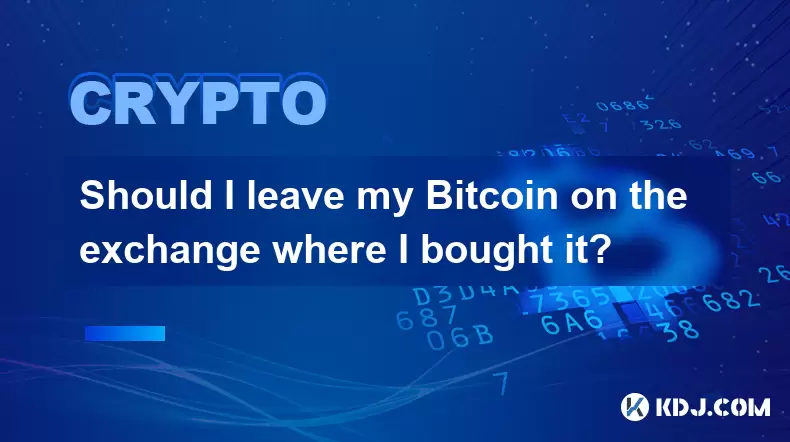
Should I leave my Bitcoin on the exchange where I bought it?
Aug 04,2025 at 06:35am
Understanding the Role of Smart Contracts in Decentralized Finance (DeFi)Smart contracts are self-executing agreements with the terms directly written...
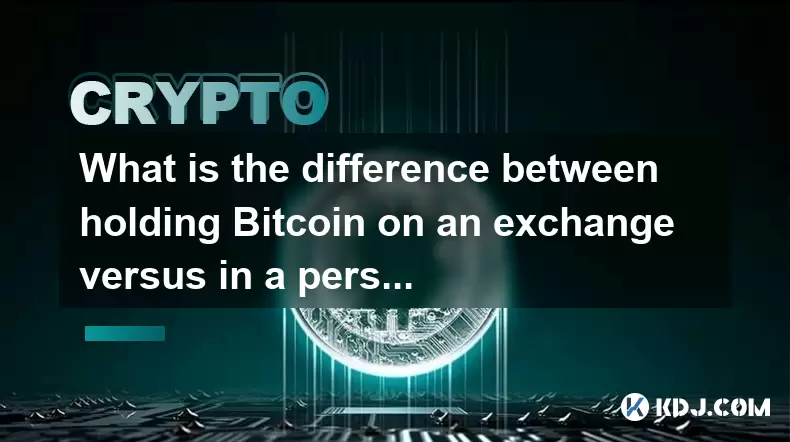
What is the difference between holding Bitcoin on an exchange versus in a personal wallet?
Aug 02,2025 at 03:15pm
Understanding Custodial vs Non-Custodial ControlWhen holding Bitcoin on an exchange, users are essentially entrusting their assets to a third party. E...
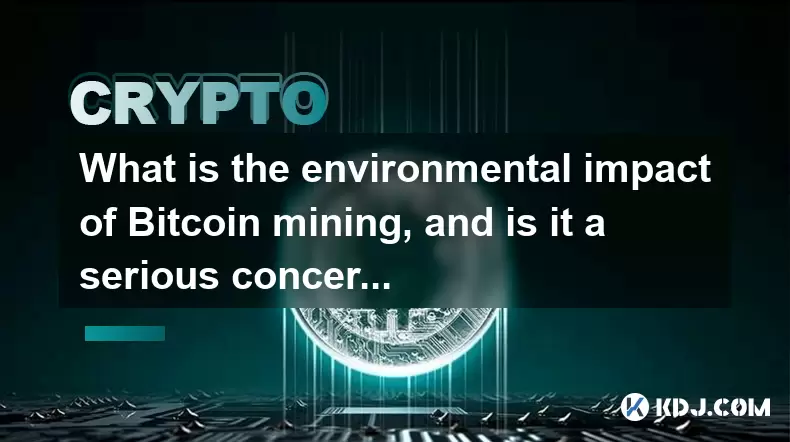
What is the environmental impact of Bitcoin mining, and is it a serious concern?
Aug 04,2025 at 02:14am
Understanding the Energy Consumption of Bitcoin MiningBitcoin mining relies on a proof-of-work (PoW) consensus mechanism, which requires miners to sol...
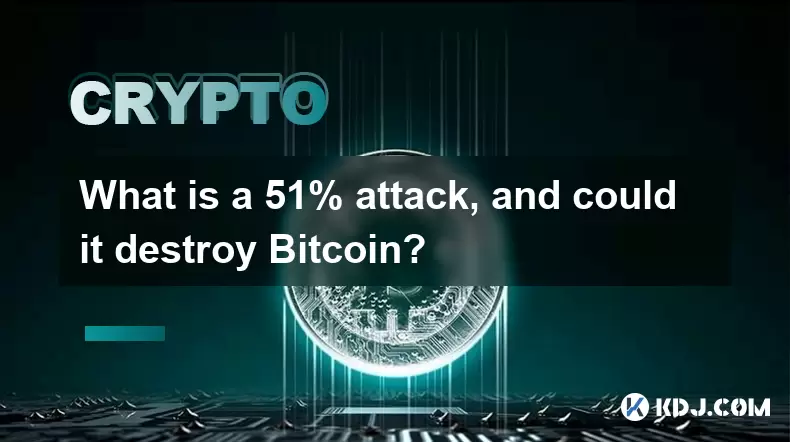
What is a 51% attack, and could it destroy Bitcoin?
Aug 03,2025 at 05:08pm
Understanding the Concept of a 51% AttackA 51% attack refers to a scenario in which a single entity or group gains control of more than half of a bloc...
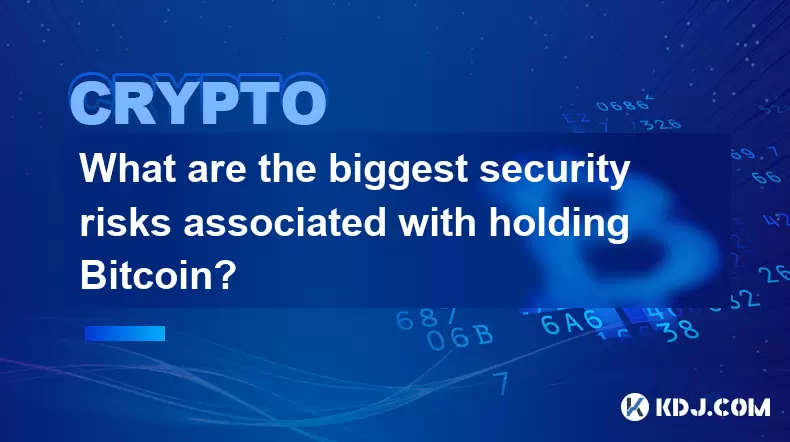
What are the biggest security risks associated with holding Bitcoin?
Aug 03,2025 at 03:16pm
Exposure to Private Key CompromiseOne of the most critical security risks when holding Bitcoin is the compromise of private keys. These cryptographic ...
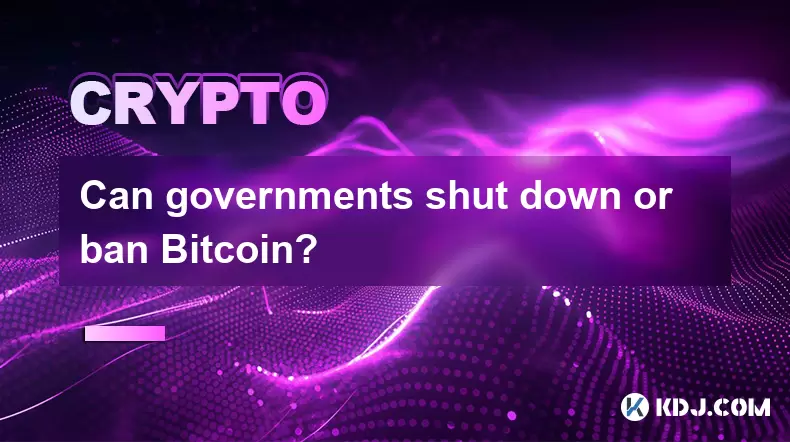
Can governments shut down or ban Bitcoin?
Aug 02,2025 at 09:44am
Understanding Bitcoin’s Decentralized StructureBitcoin operates on a decentralized peer-to-peer network, meaning it is not controlled by any single en...

Should I leave my Bitcoin on the exchange where I bought it?
Aug 04,2025 at 06:35am
Understanding the Role of Smart Contracts in Decentralized Finance (DeFi)Smart contracts are self-executing agreements with the terms directly written...

What is the difference between holding Bitcoin on an exchange versus in a personal wallet?
Aug 02,2025 at 03:15pm
Understanding Custodial vs Non-Custodial ControlWhen holding Bitcoin on an exchange, users are essentially entrusting their assets to a third party. E...

What is the environmental impact of Bitcoin mining, and is it a serious concern?
Aug 04,2025 at 02:14am
Understanding the Energy Consumption of Bitcoin MiningBitcoin mining relies on a proof-of-work (PoW) consensus mechanism, which requires miners to sol...

What is a 51% attack, and could it destroy Bitcoin?
Aug 03,2025 at 05:08pm
Understanding the Concept of a 51% AttackA 51% attack refers to a scenario in which a single entity or group gains control of more than half of a bloc...

What are the biggest security risks associated with holding Bitcoin?
Aug 03,2025 at 03:16pm
Exposure to Private Key CompromiseOne of the most critical security risks when holding Bitcoin is the compromise of private keys. These cryptographic ...

Can governments shut down or ban Bitcoin?
Aug 02,2025 at 09:44am
Understanding Bitcoin’s Decentralized StructureBitcoin operates on a decentralized peer-to-peer network, meaning it is not controlled by any single en...
See all articles

























































































